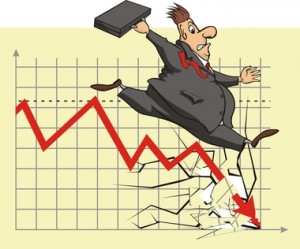The Financial Post ran this column by me this weekend about my take on the market mayhem of the past week, most of it triggered by plunging oil prices. While I’ve chosen to put this in the Wealth Accumulation section of the Hub, it occurs to me that the way things are going, it could also be in Decumulation: albeit not the kind of Decumulation we had in mind when we created the section!
For convenience and archiving purposes, I’ve included the full piece below:
The worse it gets, the less I look and the less I act. When it comes to market mayhem, I firmly believe that the time to sell is when stocks are up and everyone is buying.
Except maybe in 2008, when it seemed financial Armageddon was genuinely possible, panic seldom serves the investor well in the long run. I understand the psychology of panic as markets sink: fear takes control and investors become convinced that with every passing day, their wealth will vaporize. And yes, if you knew for sure that markets were due for a 10% correction or 20% bear market, then it would make sense to sell.
But we don’t know for sure what tomorrow will bring, and certainly not what stock market averages will be. We do know that interest rates right now are still near historic lows, even if they are expected to start moving higher in 2015. We know that in the long run, stocks are the best-performing asset class, even measured against fixed-income investments that pay more than what is on offer late in 2014. And therefore, for time horizons of five years or longer, investors accept – or should accept – that a significant portion of their wealth should be invested in stocks.
Preferably quality dividend-paying stocks spread across the major economic sectors. Barring that, a broadly diversified “Couch Potato” portfolio of index funds or exchange-traded funds, with exposure to all economic sectors and roughly equal geographical exposure to Canada, the United States and international markets outside North America.
Did they say were plunging or plummeting?
“But markets are plunging!,” the recent convert to stocks cries. Or worse, plummeting, if indeed plummeting denotes a bigger drop than a mere plunge. You can be sure that headlines will make liberal use of both verbs if this correction continues.
So what to do? If your mix of investments was decided in happier times and you’re comfortable with the amount of risk you had agreed to, then I’d say do nothing. Or, if you have sufficient cash reserves, I’d say buy stocks while they’re on sale. Certain sectors – oil stocks and commodities in general – certainly appear to be on sale. Oil is a cyclical commodity and it seems like only yesterday when the doomsayers were predicting $150 or $200 oil. That day will likely come again but in the meantime many people and companies benefit from rock-bottom oil prices: airlines to name one, and everyday commuters to name a second group of beneficiaries of low-priced oil.
Pros were buying this week
When the mayhem really started to gather steam this week, I was at a meeting with a group of semi-retired professional pension managers and investors. We barely talked about the markets over the two hours we had together, although when it did come up peripherally, one said he was buying the market across the board at these levels, while another was scooping up specific individual oil stocks.
But what if you’ve come to the sickening realization that your risk tolerance isn’t quite as hardy as you thought it was? If you were 90% in stocks but really can’t handle a 30 or 40% potential drop in more than half your portfolio, then you know your optimal asset allocation would be closer to 50% stocks to 50% bonds, not 90% to 10%. But “rebalancing” your investment mix is much better performed when stocks are rising, not falling. You’ve heard the expression “catching a falling knife?” Selling even more stocks into a broadly based general market sell-off is not a recipe for making long-term profits in the stock market.
Consolation of tax-loss selling
However, since it is tax-loss selling season and if you had previously booked gains on some winners in a taxable portfolio, you could sell a few losers right now and get your cash up to a more tolerable level, and tax-wise merely offset the previous gains. That way, at least, the taxman would share your pain and if markets worsened in the coming weeks or months, you’d have a bit of cash to snap up some real bargains, if indeed they materialize.
Of course, the declines could end as suddenly as they began. Personally, I am taking no action at all during this sell-off. And as my financial advisor often reminds his clients, if you’re in dividend-reinvestment plans, as stocks fall you’ll be reinvesting in those stocks at slightly better prices. High-yielding dividend payers will start to pay out even more tempting amounts. When stocks previously paying out 3 or 4% start yielding 5 or 6% (as the stock values themselves fall), I’d be tempted to load up on more, as many did at the depths of 2008.
Until then, try not to overdose on the day-to-day melodrama of crashing markets. Go for long walks, read fiction or otherwise get your mind off paper losses that may prove to be merely temporary.
Jonathan Chevreau recently launched a North American web portal focused on financial independence: http://www.financialindependencehub.com. He can be reached at jonathan@findependenceday.com


